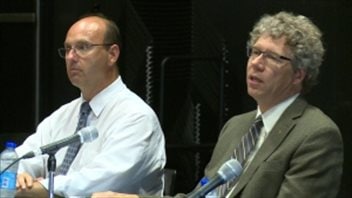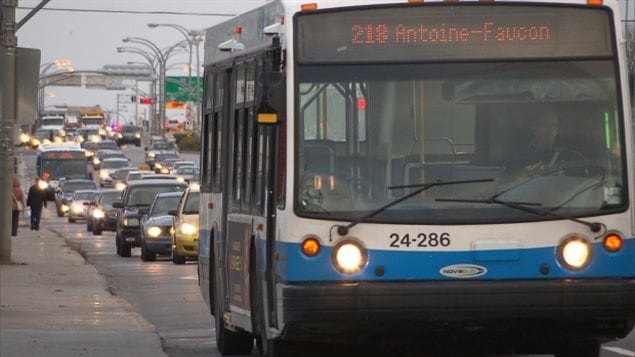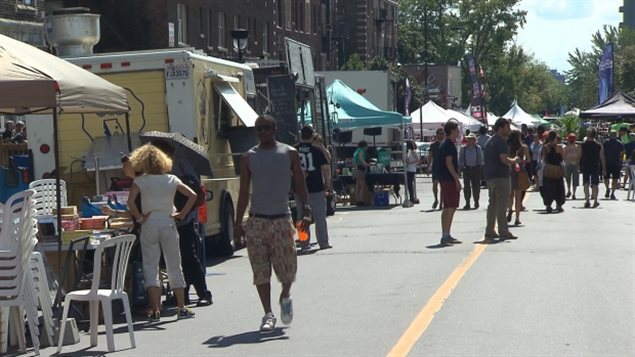Several boroughs in the city of Montreal allow portions of streets to be closed in summer for street fairs, but not everyone approves of the way they are run. After being presented with a petition protesting a street fair on Monkland Avenue in June, the borough mayor held a public meeting yesterday to explain changes he is proposing to address complaints.
Noise ‘like a jet engine’
Too much noise was one of the major issues. Residents living near a big sound stage complained the noise was unbearable and that their windows rattled during shows. When asked, a city planner Louis Brunet revealed that the sound stage emitted 80 decibels at the last street festival in July and one resident noted this was more than the sound from a jet engine. The borough is proposing to hire someone to measure noise for the upcoming festival in August and to reduce noise emitted by individual kiosks.
‘Outsiders’ compete with local businesses
There were complaints that local merchants were not well represented at the festival and that businesses from outside the neighbourhood set up on the street in direct competition with local shops. In the same way, food trucks competed with established restaurants. Businesses pay between $2,000 and $2,500 to rent a space.
Citizens asked who pocketed the money and why the borough gave a subsidy of $5,000 to the organizer of the event, Monkland Village Productions (MVP), when it made thousands of dollars of profit on these rentals.
Mayor says subsidy is justified
Borough mayor Russell Copeman said the organizer incurred many costs, including $30,000 on security alone, and that, had borough employees organized the event themselves, it would have cost taxpayers much more. He concluded that he and other borough officials were comfortable with the subsidy.
The Gazette reports that MVP reported to city council that the expenses for the June festival were $137,000 and the revenues were $149,000 plus the city’s $5,000 subsidy.

Merchants’ association credentials questioned
Copeman noted that the event was organized on behalf of an association of local merchants. Any promoter must get the signatures of 50 local businesses to get approval for a street fair. One intervener obtained the list of businesses in this case through Access to Information law. He found that, in many of the cases, it was not the owners of the businesses who had signed, but employees. Copeland said it was not up to the borough to verify this information, but up to the business owners to ensure their employees were not signing agreements on their behalf. He also suggested owners write to the borough in such cases.
Conflict of interest?
There were complaints that the promoter, MVP president Danny Roseman, was also head of the merchants’ association that applied to hold the festival. One intervener, a former city official, said that was a conflict of interest. Copeland suggested unhappy owners form a new association and make their own proposal for a street fair.
Access to public transit difficult
About seven streets are closed to vehicles for the Monkland street fairs. One disabled resident said that meant she was a virtual prisoner in her home for the duration of the festival because the usual public transit buses could not run on the street. Another said the rerouted bus stops were too far away. Copeland promised to discuss the issue with transit authorities.

Mayor will propose changes to council
Copeland will propose several changes to the August street fair to council on Monday, Aug. 8. They will include shortening the fair from four days to three, reducing the number of food trucks from 14 to nine, reducing the number of generators to three quieter units, reducing the number of streets affected, stepping up police patrols, and reducing noise. He also proposes that free kiosks be provided for more of the neighbourhood’s charitable groups.
Organizer says festival revitalizes businesses
Roseman said he has in the past provided reasonable solutions to complaints and he wishes people had come to him before sending a petition to the borough. He added that the festival is an important event which revitalizes local businesses.
One person said the festival was good for her non-profit group and allowed it to increase its profile. She added that she spoke for many people who are in favour of the festival but who did not attend the meeting.
Future consultation promised
It was made clear at the outset that this meeting would deal only with the upcoming August 19-23 festival, but Copeland promised to hold another meeting to consult residents and merchants on the future of street festivals on Monkland Avenue.
This public meeting provided a snapshot of Canadian municipal democracy at work.







For reasons beyond our control, and for an undetermined period of time, our comment section is now closed. However, our social networks remain open to your contributions.